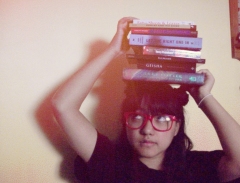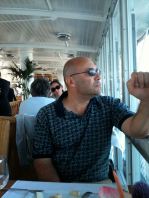Desiree Roundtree is an only child, born and raised in Brooklyn, New York.
After high school, she launched herself directly into the workforce entering into the dreaded world of financial aid and becoming nothing short of a wizard at it, even though she hates math. Crunching numbers daily she found her struggle to put words onto paper overwhelming and you could find sketches of stories on random papers strewn throughout her life.
She is an adult college student now, taking online courses that she can fit between being the wife to a superhero and the mother to a warrior princess. She began to focus on doing what she wants to do with the rest of her life, not just doing what she has to do. A Creative Writing class really opened the gates for her even though she began writing at a very young age and her imagination got her in trouble many times throughout her youth.
She met her husband and they shared two beautiful years together before they welcomed a daughter into the world. They still live in Brooklyn.
Twitter: @timesinbklyn
Tumblr: The Bklyn Times
Blogger: Times in Brooklyn
What does an average day look like for you in your creative career?
An average day in my creative career looks like me picking through my purse for all the scraps of paper I scribbled ideas on during the day or piecing together notebooks, notes and journals for story starts or ideas to incorporate into things I am already working on.
How did you get to where you are now in your career? What key moments, decisions or circumstances brought you here?
To put it simply, I started writing. I began to take myself seriously as a writer and creative being. I started to realize that just because I wasn’t able to do it right now full time and have it be lucrative enough that I shouldn’t shelf my dream for the safety net of my bank account. I took myself seriously.
What excites you most about your work?
I love what writing gives you–sometimes it’s strength or much-needed weakness. With the pieces I have written so far I love looking at how my mind works from the outside in. Then I realize that I might be a little crazy and that excites me too since only the best people are.
What is its greatest challenge for you?
My greatest challenge is attempting to remain a fresh voice in a world where everyone wants a piece of this pie. Rejection is pretty hard too!
How do you get your best ideas?
When I decided that it was time to really do this I had a million ideas and they all fell flat. I couldn’t figure out what I was missing, why nothing punched, why I felt no connection to the words. Then I started reading and stopped writing. The more you read, the better you write.
What do you do when you get stuck?
It really depends on how athletic I am that month or how sick I feel (I have Lupus and Fibromyalgia). But lately when I hit a block I try to stretch, breathe, realize that being stuck doesn’t mean it won’t come, it will. Mostly I don’t give up on myself.
How do you make sure you make time for creativity in your life?
I write constantly. Like I said earlier, even if it is a million ideas on receipts or sometimes even my hand–I write.
What advice do you have for other aspiring creatives who want to follow in your footsteps?
Don’t give up. No one will have faith in your work if you don’t. You have to learn to be your own biggest fan. Sometimes that could be the hardest part, not letting the rejections get in the way of the acceptances you want.



